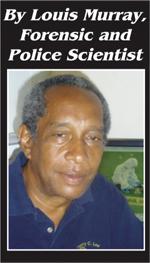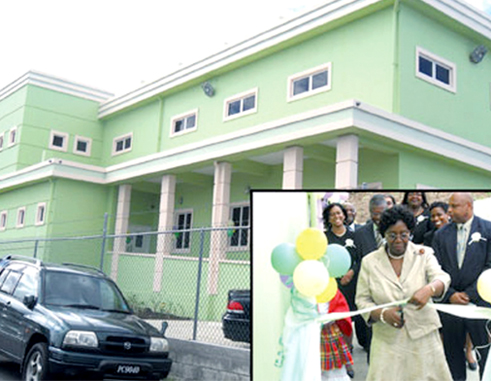 PART TWO.
PART TWO.
THIS week’s comments are on the inescapable tension between emotion and reality in reopening the forensic laboratory.
No modern day police force can be without easy access to forensic services and for every day our laboratory remains closed is one day too much that will adversely affect major criminal investigations. Consequently that service has to be restored rather than any abandonment of the massive EC$8 million investment it represents. Further, even when closed staff salaries and high electricity costs for air conditioning requirements are expenses incurred for which there are no tangible returns. With the current major dilemma the only option is referrals and as indicated by the Minister of Legal Affairs as many as 40 cases were recently sent for testing overseas. That’s a very large number obviously over a lengthy period of time and is an indication of just how long the laboratory has been dysfunctional. Ironically it was for the very reason of eliminating referrals that a modern state of the art facility with a DNA unit was constructed.
Having stated that, every attempt should be made to avoid the road of referrals because of exorbitant overall costs, detailed but necessary additional levels of documentation, lengthy waits for obtaining results and lurking dangers relating to continuity of evidence, proper locational evidence storage and evidence contamination.
Verlinda Joseph’s 2002 murder now 14 years without closure incurred tremendous and excessive costs for laboratory fees through an unusual referral process involving outsourcing and a multiplicity of laboratories. Spanning both previous government administrations are staggering costs relating to referrals for several cases sent to Forensic Science Services in England over a previous seven year period. Even then some of those cases sent remain today unresolved and here lies a dilemma that referrals are not always a guarantee of case resolution. Now we are again faced with a possibly little less than EC$500,000 price tag towards the most recent set of forensic referrals, again with outsourcing.
Many victims of crimes –particularly the unresolved ones –and their families have been crying out over the many years for justice and closure. There appears to be a nationwide crime ‘spree’ compounded by an increase in random sexual attacks on women which makes them vulnerable and afraid and more so with the Prime Minister’s serial rapists revelation. There is much emotion in the air and the authorities are under immense pressure to act but the realities associated with the answers cannot be ignored. So it is this mix of the need for, the now only one option and the exorbitant costs involved that have created a quandary that will ultimately be part of the process influencing the resolution of this whole forensic matter but there must be prudence as desperation is the worst perfume.
The setback suffered by the laboratory is major and touches every operational area. Associated with the closure was the launching of a major criminal investigation into its operations as announced by the Minister, and that is a serious indictment. Under this cloud rectification will have to be meticulously executed and backed by thorough assessments of exactly what was going on and the flaws so as to guide in the way forward. Let’s face it, the laboratory deteriorated to zero functionality and its mandates will have to be restored and the necessary put in place to facilitate the reopening of a meaningful and consistent service.
Within a relatively short time the laboratory was reduced to operating with a director and a handful of junior staff, enthusiastic they might have been but void of any upper or middle level senior technical or management personnel or cadre of support experienced examiners and trainers, an impossible situation for what was expected from it. Provisions then will have to be made for the correct levels of staff required and in particular and not to be underestimated, to seriously address what must now be a tremendous backlog of unprocessed work.
Retired agricultural laboratory administrator Calixte George Sr. has commented that the essence of a laboratory is its experienced technical personnel and has also correctly advised the need for same at our forensic laboratory. So calculations must be done correctly as I suggest the laboratory may not be able to sustain another event of that nature and magnitude as a repeat may well be its death knell.
Much of what a forensic laboratory has to rely on is the credibility of work conducted, integrity and ethical conduct of its examiners and its overall reputation. Expectedly when reopened the laboratory will come under scrutiny and will require the confidence of the scientific and legal communities and importantly the general public. The Minister indicated reopening the drug testing division, and whilst in theory that would be an easier task, in this drugs debacle it will be the most difficult. He reiterated a “major indication of criminal activity” which points to serious breaches of protocols and security and begs as to any in house facilitation or involvement.
Meanwhile after nine months the public has heard nothing of that criminal investigation and importantly the Minister admitted he has no update and “until you conclude with prosecution there are issues, real and active”. Interestingly was his statement about standards and the need to have equipment function properly. So in light of all of that, of what is professionally acceptable practice, of what is fact, of what is still unknown and a no-conclusion status, and what the Minister is saying from both sides of the coin, I am at the very least baffled that the drug testing division, the very one that precipitated the laboratory’s closure, is soon to be operational.
Operating a forensic laboratory is a costly venture which likely caught the authorities off guard. Our laboratory was not income-generating and survived off ministerial allocations. Not a happy prospect in times of budget cut backs and so ever more the reason why it should have been operated efficiently and giving value for bucks. Consequently the aspect of it serving as a referral facility for sister OECS countries is a revenue generator waiting to be explored but such cannot happen until our ‘house’ is in order.
Last week I indicated that both Dr. Stephen King and I recognized the need for private involvement in any future operations of the laboratory. But whilst government had been in discussions with a private foreign group towards a recommencement of operations, that has now been abandoned on the grounds of being too costly an arrangement. So where will that leave the whole process moving forward? Will there be a search for some other workable partnership or will it be back to an all governmental operation? Whatever, mistakes must not be swept away but learnt from by whichever entity assumes responsibility for the laboratory. However something will have to give and we can only await disclosure.













